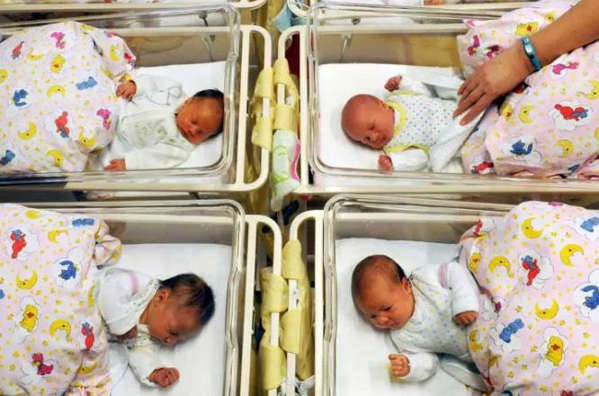
Raising children – or choosing to even have them – can be daunting with the high cost of living in Canada.
After giving birth to her first child in August of last year, 24-year-old Autumn Oliver-Giasson has decided to hold off on having more children until the high cost of living in Canada eases.
“It’s just not plausible. It doesn’t make sense,” she said.
Canada’s fertility rate has been on a steady decline since 2008, according to a 2021 report from Statistics Canada.
In 2020, as the trend only intensified by the COVID-19 pandemic, Canada experienced the lowest number of births since 2006 in 2020.
Now, with decades-high inflation rates in Canada, some are putting the decision to have children on the backburner.
‘It does make it really hard’
Oliver-Giasson said she and her husband are “struggling” with prices as they take care of their son.
And with childcare shortages, Oliver-Giasson is unsure whether she’ll actually be able to return to work full-time once her leave is up.
“I don’t even know if I’m going to be able to go back to work at all before (my son is) two because nobody will take him (now).”
To help make up some of the cost of inflation right now while on maternity leave, Oliver-Giasson has even started to babysit other children.
“I know what it’s like to be stressed out and not have options, so I want to help out a few moms (while) I’m home. It helps us with the cost of inflation,” she said.
“We’re not having another kid until we either make a ridiculous amount more money, or inflation comes down or the childcare shortage changes drastically.”
As statistics have shown, economic stresses and the toll caused by the COVID-19 pandemic have been “deterrents” for people considering whether to have children, Julia Chung, CEO and senior financial planner at Spring Planning, said.
“It’s this mind-shift about what we expect family life to look like,” she said.
However, when thinking about the financial costs of having children, it’s necessary to plan and be resilient in managing change, Chung said.
“It depends on you and what’s going to be important for you and that baby,” she said. “There are questions you need to ask yourself: What do I want this to look like? What’s involved?”
“You do get to design this even if it feels really hopeless,” said Chung.
‘Really expensive’
Twenty-seven-year-old Emily Pigeau and her husband who live in Grande Prairie, Alta. had their first child last May.
“We hadn’t planned on having kids at that point in time, but it happened,” she said.
Now, on leave from work as a small equipment operator, bills have tended to fall on her husband, a trucker.
“Three years ago, a weekly grocery shop was like $50. Now, we’re looking at like $150. That’s a huge jump,” she said.
“We don’t eat a lot of fresh vegetables. We generally do frozen stuff because it’s just cheaper to buy. If it takes more than three or four things to throw it into a pot, it gets really expensive.”
Future family planning has now been halted for Pigeau and her family.
“We would just like to build up a little bit more of a financial cushion,” she said.
‘Got to think about my family’
After recently finishing the first trimester of her second pregnancy, 32-year-old Jessica Blize in Beaumont, Alta., and her husband have cut subscriptions, budgets and even reverted to growing vegetables in their backyard to help lower costs.
“It’s been really stressful,” Blize said. “I’ve got to think about my family.”
Blize first became a mother last February, and without being able to breastfeed, she nursed her new baby amid a nationwide formula shortage.
“As soon as we started a brand that we felt like we could afford on a weekly basis, they stopped making it, along with all the other affordable formulas,” she said.
“A couple of the brands that were left on the shelves — because of supply and demand — went up to about $90 a can, and it doesn’t last very long when your newborn eats five, six, seven times a day and then in the night.”
This time around, Blize’s pregnancy was unexpected, and she hopes to see prices decrease.
“We had actually anticipated on waiting a little longer to see if we could offset the financial side of things, but God had his way,” she said.
“When you become a parent that is your number one concern, is making sure your kid has its needs,” said Blize. “So my biggest advice is just accept the help or ask for help and to not be shy about it.”
Blize will be completing her family with this last baby. Not only has it been tough to be pregnant, “kids are expensive and continue to get pricier as they get older,” she said.
According to Rona Birenbaum, founder of financial planning and wealth management firm Caring for Clients, there is a way to determine if you’re financially ready to have kids.
“It all comes out in a financial planning process,” she said, noting confiding in a financial planner can help the process along.
“Planning head is key. Even though much of life is unpredictable, there are certain things that once can anticipate happening with some financial modelling. The numbers speak for themselves in terms of what’s affordable and isn’t affordable,” Birenbaum said.
When thinking about having children, however, it’s important to recognize “the ripple effect of one single decision,” cautioned Birenbaum.
“There are some expenses that sometimes creep up on parents unexpectedly. For example, starting your kids in hockey. Any parent that wants to encourage that talent is going to be signed up for a lot of expenses down the road. Think about the possible growth in expenses,” she said.
It’s also essential to take note of compromises that may need to be made, when thinking about having a child, according to Birenbaum.